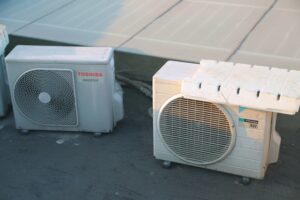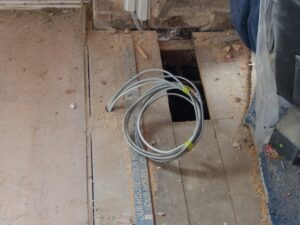If you own a home, you know how important it is to have the right safety measures in place.
But have you ever thought about your water heater’s emergency shut-off valve?
This small but powerful feature is crucial for preventing potential water damage in your home, and it’s something every homeowner should understand.
An emergency shut-off valve is designed to automatically cut off the water supply to your water heater if there’s a leak or another emergency situation. In doing so, it can save your home from water damage, prevent costly repairs, and keep your family safe.
So, why is it so important to have one?
In this blog, we’ll dive into why these valves are essential for your home’s safety.
At Excel Mechanical, we understand the significance of having a working water heater emergency shut-off valve. As a leading provider of HVAC and plumbing services, we’re here to ensure your home is protected with reliable systems that meet your needs.
Whether it’s a new installation or regular maintenance, our experts are ready to help.
In this blog, we will talk about:
- The importance of water heater emergency shut-off valves for home safety
- Types of shut-off valves and how to identify them
- How Excel Mechanical can help with installation and maintenance
So, let’s get started!
Understanding Water Heater Shut-Off Valves
Water heater shut-off valves are a critical part of your water heating system.
Ever wondered how you can quickly stop water flow in case of an emergency?
These valves are designed to control the water flow into your heater, helping you isolate the system when something goes wrong—whether it’s a leak, pipe burst, or other issue. Having a shut-off valve ensures that you don’t experience excessive water damage while you address the problem.
In this section, we’ll take a closer look at the different types of shut-off valves, where they’re located, and how you can identify them.
Knowing this will help you feel more confident in handling potential plumbing emergencies.
Types of Water Heater Shut-Off Valves
When it comes to shut-off valves, there are primarily two types you should know about:
- Gate Valves: These are the older models, commonly found in older homes. They work with a knob that you turn to either open or close the valve. While they get the job done, gate valves are a bit slower to operate and can wear down more easily over time.
- Ball Valves: These are the more modern option, found in newer homes. Ball valves are often the preferred choice because they’re much easier to operate, with a simple lever that you turn 90 degrees. Not only are they faster, but they’re also more reliable and less prone to leaks than gate valves.
So, if you have a ball valve, you’re in great shape! But if your home still has an old gate valve, don’t worry—it can still work fine, as long as it’s in good condition.
Location and Identification
Knowing where your shut-off valve is located is vital, especially in the case of an emergency.
So, where should you look?
The shut-off valve is usually located near the cold water inlet pipe at the top of the water heater. It’s typically easy to spot, and you’ll either see a knob (for gate valves) or a lever (for ball valves) for operation.
If you’re unsure about the location, don’t hesitate to check the water heater manual or give a professional plumber a call.
Knowing where the valve is will allow you to act quickly in the event of an emergency and shut off the water supply to prevent further damage.
The Importance of Emergency Shut-Offs
As a homeowner, have you ever thought about what you would do if your water heater suddenly started leaking?
Whether it’s a burst pipe or a faulty valve, a plumbing emergency can escalate quickly, causing serious water damage to your home. That’s where the emergency shut-off valve comes in—it can be a lifesaver in these situations, helping you prevent water damage and save money on repairs.
In this section, we’ll discuss why emergency shut-off valves are so important and how they can protect your home and family.
Preventing Water Damage
Water damage can be devastating and expensive to repair.
In the event of a plumbing emergency, shutting off the water supply to your water heater can prevent water from continuing to flow and causing further damage.
This can save you from costly repairs and the headache of dealing with water damage to your property.
Immediate Action in Plumbing Emergencies
In the event of a plumbing emergency, every second counts.
If you wait too long to shut off the water supply, it could make things worse.
But how do you know what to do when something goes wrong?
That’s where the emergency shut-off valve comes in—it allows you to take immediate action and reduce damage before the professionals arrive.
Think about this: If your water heater bursts, water is going to pour out fast. But by quickly turning the emergency shut-off valve, you give yourself more time to assess the situation, call a plumber, and take the necessary steps to fix the problem.
If you’re unsure of how to operate the valve, don’t worry.
Excel Mechanical can help you get familiar with your system and make sure the emergency shut-off valve is in good working condition.
How to Operate Your Shut-Off Valve
When an emergency strikes, knowing how to operate your water heater’s shut-off valve can be the difference between minor inconvenience and major water damage.
So, how do you turn it off quickly when you need it most?
In this section, we’ll walk you through a simple, step-by-step guide on how to operate your shut-off valve, along with troubleshooting tips for common issues.
Step-by-Step Guide
- Locate your shut-off valve: Your shut-off valve is typically located near your water heater or where the main water supply enters your home. It may be a lever or a knob that you can turn to shut off the flow of water.
- Turn off the main water supply: Before operating your shut-off valve, it’s important to turn off the main water supply to your home. This will prevent any water from flowing through your pipes while you work on the shut-off valve. To turn off the main water supply, locate the main shut-off valve and turn it clockwise until it stops.
- Turn off the shut-off valve: Once you have turned off the main water supply, you can turn off your shut-off valve. If your valve is a lever, turn it so that it is perpendicular to the pipe. If it is a knob, turn it clockwise until it stops.
- Check for leaks: After you have turned off the shut-off valve, check for any leaks around the valve or in your pipes. If you notice any leaks, it’s important to call a professional plumber to fix the issue.
Troubleshooting Common Issues
If you are having trouble operating your shut-off valve, here are some common issues you may encounter and how to troubleshoot them:
- Valve is stuck: If your shut-off valve is stuck, try using a pair of pliers to turn it. If this doesn’t work, it may be time to call a professional plumber to replace the valve.
- Valve is leaking: If your shut-off valve is leaking, it may be due to a damaged or worn-out seal. You can try tightening the valve or replacing the seal to fix the issue.
- Valve is not turning off the water supply: If your shut-off valve is not turning off the water supply, it may be due to a damaged or broken valve. In this case, it’s important to call a professional plumber to replace the valve.
Regular Maintenance and Inspection
When it comes to your water heater, how often do you think about giving it a little check-up?
You might not realize it, but just like your car, your water heater needs regular maintenance to keep it running smoothly and prevent emergencies.
Let’s talk about some essential maintenance tips to keep your water heater in top condition, as well as why regular inspection is key to avoiding future problems.
Checking for Corrosion and Sediment
Over time, sediment can build up in your water heater tank, reducing its efficiency and potentially causing damage.
To prevent this, it is recommended that you flush your water heater tank at least once a year.
To do this, turn off the power or gas supply to your water heater and let it cool down. Then, connect a hose to the drain valve at the bottom of the tank and drain the water until it runs clear.
Additionally, it is important to check for signs of corrosion on your water heater tank.
Corrosion can weaken the tank and cause leaks, which can lead to water damage in your home.
If you notice any signs of corrosion, such as rust or discoloration, contact a professional plumber to inspect your unit.
Scheduling Professional Service
While there are some maintenance tasks you can do yourself, it is important to have your water heater professionally serviced on a regular basis.
A professional plumber can inspect your unit for signs of wear and tear, check the pressure relief valve, and ensure that your unit is operating at maximum efficiency.
Contact us today to schedule your water heater maintenance service.
Professional Installation and Repairs
When it comes to your water heater’s emergency shut-off valve or any repair work, have you considered the importance of professional help?
While some DIY tasks are manageable, there are certain things you don’t want to risk getting wrong—especially when it involves your home’s plumbing system.
In this section, we’ll discuss why choosing a licensed professional plumber for installation and repairs is essential to ensure everything is installed or fixed correctly and safely.
Choosing the Right Plumber
Not all plumbers are created equal.
When it comes to installing or repairing your emergency shut-off valve, you need someone with experience and expertise. But how do you choose the right plumber?
Here are a few things to look for:
- Licensing and Insurance: Always choose a plumber who is licensed and insured. This guarantees that the job will be done according to code and that you’re protected in case anything goes wrong.
- Reputation: Do your research. Ask for referrals from friends or family, or check online reviews. A good reputation means they’ve delivered reliable services to others.
- Experience: Ensure the plumber has experience with water heaters, as this specific skillset is vital for proper installation and repairs. A plumber who knows the ins and outs of water heaters will ensure everything is set up correctly.
Excel Mechanical is proud to offer expert plumbing services with highly trained professionals who specialize in water heater installations and repairs. We are licensed, insured, and dedicated to getting the job done right the first time, offering solutions tailored to your home’s specific needs.
Understanding the Costs
One common question homeowners have is, “How much will it cost?”
The cost of installing or repairing a water heater shut-off valve can vary depending on several factors, including:
- The complexity of the job: For example, replacing an old valve may be less expensive than installing a new one.
- The type of valve: Ball valves may be more expensive than gate valves, but they offer better long-term reliability.
- Labor and materials: Depending on where you live and the plumber’s rates, the total cost will vary.
It’s always a good idea to get a detailed estimate before any work begins. Transparency is key to avoiding unexpected costs down the line. At Excel Mechanical, we provide upfront pricing, so you’ll always know what to expect before we start any work.
Pro Tip: While the cost might seem high upfront, consider that investing in professional installation or repairs can save you money in the long run. Properly installed and maintained valves can help prevent water damage, expensive repairs, and long-term issues down the road.




